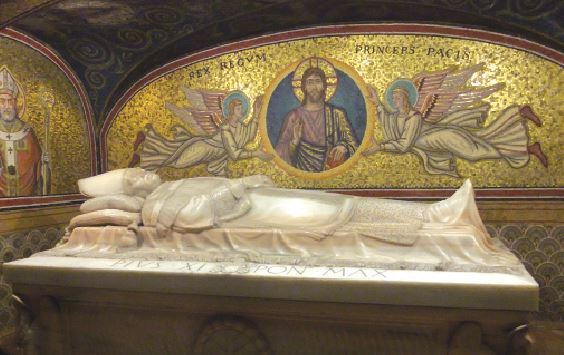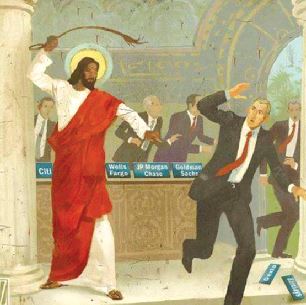After the release of Rerum Novarum in 1891, the next forty years saw World War I (1914-1918), followed by a boom in the economy, and then the Depression of the thirties. This economic crisis could not be logically explained, since there was unused production capacity in the face of needs that remained unsatisfied.
 Pius XI, pope from 1922 to 1939 Pius XI, pope from 1922 to 1939 |
The crisis was neither due to some natural catastrophe, the disappearance of skills, nor the refusal of people to work: there were millions of unemployed people who were looking for a job! Everyone was repeating the same thing: “No money!” Consumers as well as producers were lacking money. Nothing else was lacking: the production capacity and the manpower were still there.
For sure, there had been some intervention in the financial sector of the economy, which caused all economic life to suffer. It was no longer a question of the oppression of the workers by their employers, since both were now the victims of the lack of money.
But during the forty years that had passed since Rerum Novarum, inquiring minds had turned their attention towards this mysterious sector of the economy—money and credit. Discoveries had been made and published. These discoveries were not known or admitted everywhere yet, but they were not completely ignored either, since they had many proofs to support them.
The most distinguished of the discoverers was a superior mind who did not content himself with noting down facts, but also established their causes, and presented proposals to make the financial system a servant of the human person instead of a dictator. This man was the Scottish engineer Clifford Hugh Douglas, author of the Social Credit financial proposals, which are frequently explained in MICHAEL.
On May 15, 1931, exactly forty years after the publication of Rerum Novarum, Pope Pius XI issued another remarkable encyclical, Quadragesimo Anno, on the reconstruction of the social order. The Pope first noted that since the time of Leo XIII, economic conditions had changed a lot. Indeed! He wrote:
“In the first place, it is obvious that not only is wealth concentrated in our times but an immense power and despotic economic dictatorship is consolidated in the hands of a few, who often are not owners but only the trustees and managing directors of invested funds which they administer according to their own arbitrary will and pleasure.
“This power becomes particularly irresistible when exercised by those who, because they hold and control money, are able also to govern credit and determine its allotment, for that reason supplying so to speak, the lifeblood of the entire economic body, and grasping, as it were, in their hands the very soul of production, so that no one dare breathe against their will.”
These are strong words. Nobody can understand them better than the Social Crediters. Douglas knew how to differentiate between the possession of wealth and the power to control the lives of others. It is not so much the profits—even huge ones—of individuals or corporations that vitiated the economic order or were to blame, as the control of credit, the control of the lifeblood of the entire economic body. In an age of plenty, it is not so much the large share received by a few that is harmful, as the nondistribution of the huge part that is wasted in warehouses, or destroyed, or not produced because of lack of purchasing power among the families that would need these products.
 The tomb of Pius XI The tomb of Pius XI |
The existence of such a control over the economy, that can throw the whole globe from a bout of fever to a crisis of anemia, brings about plenty of undeserved ills. Pius XI was right to say, in the same encyclical: “All economic life has become tragically hard, inexorable, and cruel.”
In the face of such a situation, what can those who suffer do, when governments themselves obey the dictates of the money powers? Read what the Pope said about this abdication of governments:
“To these are to be added the grave evils that have resulted from an intermingling and shameful confusion of the functions and duties of public authority with those of the economic sphere—such as, one of the worst, the virtual degradation of the majesty of the State, which although it ought to sit on high like a queen and supreme arbitress, free from all partiality and intent upon the one common good and justice, is become a slave, surrendered and delivered to the passions and greed of men.”
The declaration of war in 1939, which put a sudden end to the ten-year money shortage, clearly showed that the scarcity of money was not a natural phenomenon, but something imposed by controllers who could put an end to it overnight if they wanted to. Governments who, for ten years, had no money to help the unemployed, found billions overnight to finance a six-year war. There was then absolutely no doubt that it was a criminal, diabolical dictatorship. One could have hoped that once the war was over, and the world freed from the necessity to produce for war, authorities would no longer tolerate this insane financial system. And yet the same monopoly of credit still exists today.
In his encyclical, Pius XI did not speak only about the control of credit. He gave many pieces of advice which, if they had been followed, would have improved the social and economic order. Advice of an evangelic nature, of course: the practice of justice and charity, moral renovation; but also advice about the distribution of material goods so that, without undermining the legitimate private property of the means of production, every human being may enjoy a proper standard of living. Besides, this is precisely the purpose of an economic system that is truly at the service of the human person, as Pope Pius XI wrote:
“For then only will the social and economic organism be soundly established and attain its end, when it secures for all and each those goods which the wealth and resources of nature, technical achievement, and the social organization of economic affairs can give. And these goods ought indeed to be enough both to meet the demands of necessity and decent comfort and to advance people to that happier and fuller condition of life which, when it is wisely cared for, is not only no hindrance to virtue but helps it greatly.”
The wise use of goods is the responsibility of the human person. But the proper distribution of goods —of which the quantity today can potentially provide the necessities of life to everyone—depends on “the social organization of economic affairs”.
In today’s world, distribution is done through sales and purchases. In order that all may have access to enough goods to cover the necessities of life, all must obtain enough purchasing power to buy these goods. This is a financial issue.
 If Jesus came back today, he would If Jesus came back today, he wouldprobably chase out these money changers... |
So, just as Leo XIII did before him, Pius XI asked, for the working classes, sufficient wages. He conceded that it is not always easy to determine the proper wage rate: If this rate is too low, workers and their families suffer hardships; if it is too high, it can jeopardize the existence of the enterprise and create unemployment.
Everybody also knows that wage increases soon bring about price increases. But there is more: the problem is not limited to a just proportion between the share due to capital and the one due to labour: the sum of the two parts does not equal the sum total of the prices, even if economists say that it does.
The Social Crediters know all that. But governments and their economic advisors have refused Social Credit. As long as they refuse to apply the Social Credit financial proposals (they may call them whatever they want), the problem will only get worse, because of the inflation resulting from an endless race between wages and prices. And because of technological progress, the increase of automation in production, which causes more goods to be produced with less human labour.
Douglas’s Social Credit proposals offer all that is needed to adapt the financial system to all the conditions that may exist in production. But authorities refuse Social Credit, and prefer to trudge through patchwork half-solutions that suppress freedoms, degrade the dignity of those they are supposed to help, ruin family and small businesses by overburdening them with taxes, and put bureaucrats everywhere, leading to State socialism.
The State then no longer stays in its subsidiary role; it takes on functions that are none of its business: production, trade, insurance, education, etc., always under the pretext that families, associations or lesser public bodies are financially unable to accomplish them. If they are financially unable, it is because the financial system, that only the State can modify, is not doing its job well.
And the government, instead of doing its job— correcting the financial system—persists in doing more and more functions that are the responsibility of people and families—who could accomplish these functions very well if the government accomplished its own, which is to correct the financial system.
The Pope said that a sincere return to the doctrine of the Gospel would lead to a social renovation, to collaboration between classes, instead of struggles. And those who feel oppressed today would no longer turn to socialism, which kills any form of freedom.
Twenty-three years after Rerum Novarum, the European nations became involved in World War I. Eight years after Quadragesimo Anno, worldwide slaughter happened again, with even more powerful means of destruction. This was not, of course, because of these two encyclicals but because of the too-little attention paid to them. How could authorities pay attention to them when they considered the monopoly of credit as sacred and untouchable, when the whole economic life was submitted to the dictatorship of money, when money was the first and last end of any enterprise ?
We do not hesitate to say this: the refusal of Social Credit—which is the refusal of a human philosophy of distribution that perfectly corresponds to the principles recalled by the Popes—has perpetuated undeserved sufferings, disorders, and upheavals. This refusal is all the more criminal on the part of authorities in nations like ours, who cannot pretend not to know about the Social Credit proposals.
The consequences of this refusal are incalculable, even as far as the order of spiritual values. Not because Social Credit is a sacrament, but because it would remove obstacles, because it would supply all and each with the necessities of life, sufficient “to meet the demands of necessity and decent comfort and to advance people to that happier and fuller condition of life which, when it is wisely cared for, is not only no hindrance to virtue but helps it greatly.”
Louis Even